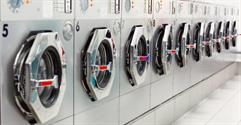Is it a good idea to buy a laundromat? This is a valid question, as buying any business will have its rewards and risks. Buying a laundromat in Texas is a rational idea, and this article will list the top reasons why it is an appealing choice for new small business owners.
We’ll also provide answers to the following questions:
- How profitable is owning a laundromat?
- What are the tax benefits of owning a laundromat?
- How much does it cost to buy a laundromat in Texas?
Laundromats have a high survival rate and ROI
Laundromats have a 95% success rate, including a ROI of 20 – 35%. It can be very profitable to own a laundromat, as it requires minimal labor costs, and you can generate a cash flow of up to $300,000 per year, including an annual gross income between $30,000 and $1 million. However, this will require dedication, maintenance, exceptional customer service and loyal patrons.
Investing in a laundromat can provide relatively passive income, but you will still need to communicate with customers and manage the store. However, utilizing technology and hiring someone to oversee the operation can help you separate time from income. It just depends on how involved you want to be.
Work-life flexibility
Buying a business that offers work-life balance is essential for many entrepreneurs, and many owners of laundromats consider it a part-time job to maintain this balance.
While you may want this venture to be a full-time job, it is unlikely that you’ll need to be in the store for 40 hours a week. You can also set your own hours, ensuring you make time to pursue personal goals or attend to other responsibilities.
Easy management
Owning a laundromat requires minimal management. You won’t need dozens of employees to run the business. Responsibilities, payroll, scheduling, and other tasks will not be overwhelmingly difficult.
Laundromats also have minimal rotating inventory requirements. Although you will need to maintain or replace equipment, it’s unlikely that you will need to do this every week or month.
It’s also a simple business to own. Apart from building relationships with your customers and retaining them, you won’t need to invest an overpowering amount of effort or time when it comes to labor costs and training.
Laundromats have tax benefits
If you want to know what the tax benefits of owning a laundromat are, we’ll get straight to the point.
The topic of tax can be the last thing business owners want to read about, but it’s important that laundromat owners understand the tax benefits of owning a laundromat.
Bonus depreciation is a tax incentive that allows laundromat owners to deduct the price of eligible assets (like your equipment) in the first year, rather than spread it over the usable life of the equipment. Under the Tax Cuts and Jobs Act of 2017, a new law has increased this bonus depreciation to 100% of eligible assets, provided you meet certain requirements.
How BusinessesForSale.com can support you
It’s clear that buying a laundromat can be a profitable and relatively easy business venture, but how much would it cost to buy a laundromat in Texas?
A quick search for laundromats for sale in Texas on BusinessesForSale.com demonstrates that asking prices range between $65,000 - $7 million.
We also have a helpful article on how to buy a laundromat, which offers guidance on choosing the right location, due diligence and much more.
And, once you’re certain you want to become a laundromat owner, read our article on how to run a laundromat, so you can prepare for the risks (and rewards) ahead!


